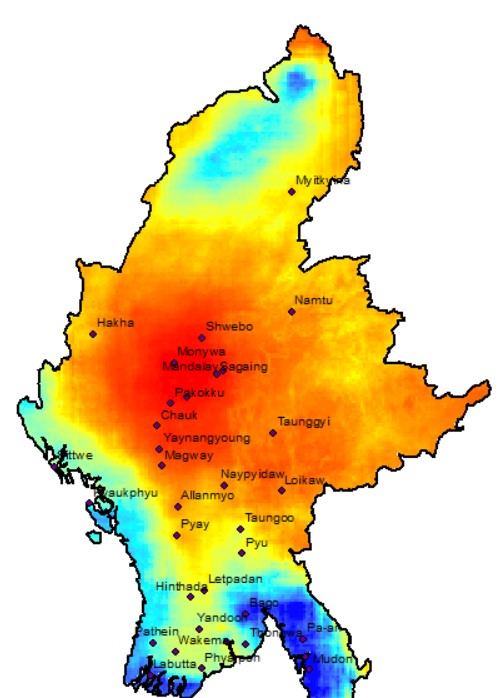Significant decisions are to be made to manage and engineer the water systems in Myanmar and to develop large structural and non-structural projects (e.g. hydropower dams, urban water use, industrial development, extension of irrigation capacity, operational quantity and quality management, etc.). The Myanmar and Dutch governments have agreed to cooperate on Integrated Water Resources Management through an MoU between the Myanmar Ministry of Transport and Dutch Ministry of Infrastructure and the Environment. To build on the activities that have been performed under this MoU and improve current monitoring systems in Myanmar, the project “Leapfrogging Delta Management in Myanmar” was initiated by TU Delft, FutureWater and HKV Consultants, and funded under the Partners for Water program. Based on its experience in operational rainfall monitoring and downscaling to high resolutions using satellite-derived information, FutureWater is developing the first near-real-time spatial rainfall product for Myanmar. The global algorithms will be tailor-made to the Myanmar situation. Results are made available through an online platform.
Significant decisions are to be made to manage and engineer the water systems in Myanmar and to develop large structural and non-structural projects (e.g. hydropower dams, urban water use, industrial development, extension of irrigation capacity, operational quantity and quality management, etc.). Global experience shows that such activities can have irreversible consequences and impose significant costs to economies, cultures and the environment. Early integration of inclusive management strategies can prevent future problems. This is recognized in Myanmar. The Myanmar and Dutch governments have agreed to cooperate on Integrated Water Resources Management (IWRM) through a Memorandum of Understanding (MoU) between the Myanmar Ministry of Transport and Dutch Ministry of Infrastructure and the Environment. To build on the activities that have been performed under this MoU, the project “Leapfrogging Delta Management in Myanmar” was initiated by TU Delft, FutureWater and HKV Consultants, and funded under the Partners for Water program.

Most monitoring and all operations in Myanmar are currently not near-real time. In the Ayeyarwady Delta some real-time data collection stations for water level, rainfall and water salinity measurements have been installed. Yet most data, such as rainfall and water levels, are collected on paper and sent to central offices by post, which can take 2 months. There are also data gaps in the monitoring network, automatic collection of data can diminish the data gaps. Surface water quality is measured only twice a year. Stage-discharge curves once every five years, which is insufficient as the Myanmar rivers are changing rapidly, leading to inaccurate discharge data. Besides monitoring, the big challenge in Myanmar is to convert raw data into useful information for (end) users. Dutch companies have developed tools and assimilation schemes to combine data and convert it into useful and understandable information for different types of clients and users.
In response to the request of the NWRC in Myanmar and the interest of Dutch innovative enterprises, the project’s main aim is to extend the current work in the Bago-Sittaung to the whole Ayeyarwady Delta in accordance with the agreement between the Myanmar and Dutch governments. The aim is to test and demonstrate innovative smart information solutions in the Delta and disseminate the results widely. Coalitions are created around specific information products (e.g. rainfall, erosion, subsidence). In each coalition, partners work on innovative monitoring: to combine remote sensing, ground data collection with modelling techniques. Opportunities and limitations are discussed with Myanmar professionals. In phase two of the project these innovations are tested, both in the field as well in a data platform environment. Innovative technologies and methods will be adjusted according to local circumstances and requirements in consultation with Myanmar. The successful proven innovations are demonstrated during two demonstration weeks in phase three, in which the entrepreneurs explain the products and the results of the testing to the Myanmar stakeholder and (end) users and to the international donors active in this field in Myanmar.
The results of the project will be presented in an online platform based on HKV Dashboard technology, to disseminate the products and services to a local and international audience. Throughout the entire project Dutch and Myanmar experts and young professionals will work together (learning-by-doing) and dissemination and training will be organized. This will facilitate easy adaptation and implementation of the innovations within the Myanmar government.
Based on its experience in operational rainfall monitoring and downscaling to high resolutions using satellite-derived information, FutureWater is developing the first near-real-time spatial rainfall product for Myanmar. The global algorithms will be tailor-made to the Myanmar situation. The first results come available through the online platform over the course of 2017.


